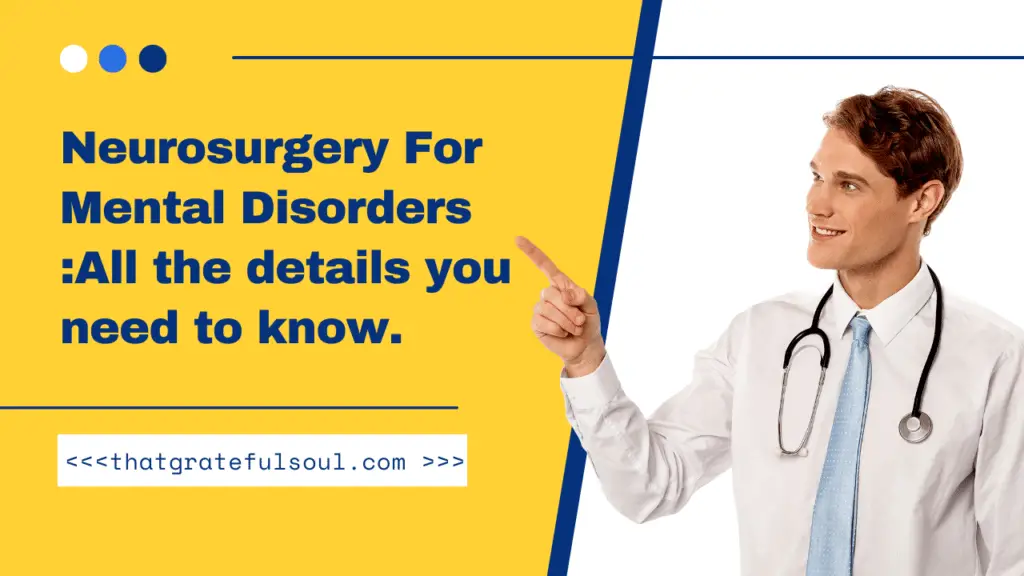Neurosurgery for mental disorder (NMD) is a type of brain surgery used in extremely rare cases to treat severe and long-term mental health problems when all other treatments have failed.
The surgery’s goal is to remove small areas of brain tissue that may be contributing to your mental health issues. (For more information on how NMD is performed, see our page on the procedure.)

-
Save
NMD carries extremely serious risks. Your doctor should only discuss this option with you if you have exhausted all other treatment options and discovered that they are ineffective.
Other treatments you could try before considering NMD include:
- Cognitive-behavioral therapy is one example of a talking treatment (CBT).
- Antidepressants, for example.
- Electroconvulsive therapy (ECT).
What Problems can do NMD treat?
The National Institute for Health and Care Excellence (NICE) does not currently recommend NMD to treat mental health problems. This is due to a lack of evidence regarding its safety and efficacy.
NMD, on the other hand, is used to treat the following conditions in extremely rare cases:
- Depression.
- Anxiety disorders
- Severe obsessive-compulsive disorder (OCD).
What are the Techniques used in NMD?
Neurosurgery for mental disorders (previously known as “psychosurgery”) is a well-established treatment effective in a subset of carefully selected patients. Neurosurgery is not used to change behavior. When all other treatments have failed and a patient is left with no choice but to suffer, it can be used to treat severe and incapacitating mental disorders. It is now mostly used to treat severe depression, chronic anxiety, and obsessive-compulsive disorder.
Recent brain stimulation techniques, notably deep brain stimulation (DBS) and vagus nerve stimulation (VNS), involve surgical intervention. Still, the primary goal is not to create an irreversible lesion in the brain but to stimulate one or more brain regions. This position statement does not cover these brain stimulation techniques on ‘neurosurgery for mental disorders’ or ‘psychosurgery,’ which only covers ablative neurosurgery.
How does A Brain Simulation work?
A surgeon surgically implants tiny electrodes in the nucleus accumbens, the brain region responsible for:
- Release of dopamine and serotonin
- Motivation.
- Mood.
The procedure necessitates many steps. First, the electrodes are placed by the doctor, and the wires and battery pack are then implanted a few days later. The electrodes are wired to a pacemaker-like device implanted in the chest that sends electrical pulses to the brain. The pulses, which are generally delivered continuously, appear to block neuron firing and return the brain’s metabolism to a state of equilibrium. A handheld device can program and control the pacemaker from outside the body.
Although doctors aren’t sure why the pulses help the brain reset, the treatment appears to improve mood and provide a general sense of calm.
Is NMD effective?
It’s difficult to say how effective NMD is for treating mental health issues, and this is because it is only given to a small number of people, and different surgical techniques are used.
Several research studies indicate that it may help reduce the symptoms of severe depression and OCD that other treatments have not helped. However, there has been little research into how long these benefits last.
If you believe NMD may be the proper treatment for you, talk to your doctor and a psychiatrist about the benefits and risks of the procedure. They may advise you to try other treatments first, or they may refer you for an evaluation to see if NMD can help reduce your symptoms.
Book an appointment now to answer all your queries. You can book an appointment with the top Psychiatrist in Lahore through Marham by calling the Marham helpline: 0311-1222398 or online booking facility through the website or Marham mobile app.
Frequently Asked Questions(FAQs)
Psychosurgery is a type of surgery that involves the ablation or disconnection of brain tissue to alter affective or cognitive states caused by mental illness.
Even if they believe ECT could help them, not everyone is a candidate for treatment. Children under the age of eleven, for example, are not permitted to receive ECT for mental health disorders. People with heart conditions and those who cannot tolerate short-acting sedatives or muscle relaxants should avoid ECT treatments.
In its current form, DBS is a relatively new neurosurgical treatment for TRD. The use of neurosurgery in the treatment of depression, on the other hand, has a much longer history, particularly with ablative procedures but also with vagal nerve stimulation.

